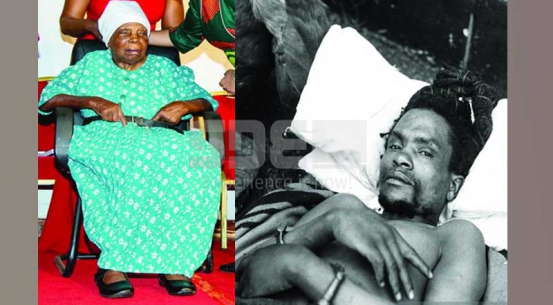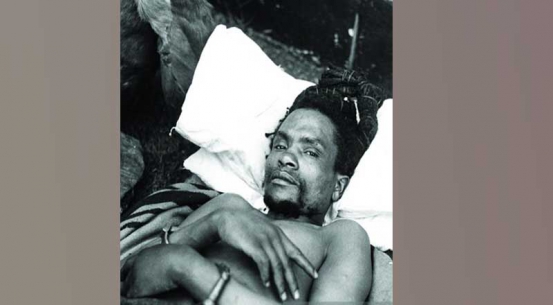
“I want to see my husband’s grave. I want to get his body and bury him like a king because he sacrificed his life for Kenya to be free”.
This was the request Field Marshal Dedan Kimathi’s wife Mukami Kimathi made in Nairobi on February 18, 2017 during the 60th commemoration of the Mau Mau leader killed by British government in 1957.
A frail, sickly 86-year-old Mukami could only utter these words as she watched forlornly from a wheelchair as Kenyans celebrated her life as Mau Mau fighter. But she was not contented seeing her dream to bury Kimathi ebb away as age takes toll on her. The journey to trace Kimathi’s grave has been tortuous, and full of frustrations, falsehoods and empty promises.
But why has the Mau Mau leader’s grave s remained such an elusive subject? Joseph Mwangi alias General Kihithuki who fought alongside Kimathi — and who was destined to hang after they were arrested and jailed in 1958 — says the killing of Kimathi was to tame his destiny.
Mwangi, 80, believes Kimathi was to take over as the president once independence was realised: “This would have created a complicated situation between Kimathi and Jomo Kenyatta. Indisputably, Kimathi was destined for the country leadership, and the British were never comfortable with him”.
The ex-general’s assertion is reaffirmed by documents released by the British government last year purportedly to give justice to his family. But the document reveal a scheme that deflated Kimathi’s heroic status and ascendance to power.
Colonialists had placed a hefty bounty on Kimathi’s head as head of Mau Mau, and when he was shot by a homeguard — who was awarded with cash — he was sentenced for “unlawful possession of ammunitions” before the Chief Justice of the Colonial Supreme Court of Kenya, Sir Kenneth O’Connor, on November 27, 1956.
Mukami now believes the charge was twisted to ensure her husband once killed and buried in undisclosed point could be forgotten. In the book Mukami Kimathi Mau Mau Freedom Fighter published recently chronicling her life, she says:
“Why did they not charge him as who they claimed he was — leader of Mau Mau? Why did they downgrade his charge? Was it not to ensure that he did not acquire martyr status after they had killed him? Why did they hide the details of what they did with his body after they killed him? Where is Kimathi’s body? Where is Dedan Kimathi buried?”
The widow received the file on March 17, 2016 from then Chief Justice Dr Willy Mutunga with hope that it would answer motley of questions and mysteries surrounding Kimathi body but it turned out to be a whopper.
“I cried when I received the file, because I believed that finally the file with all the answers had arrived. But alas, this was not the case. The file is clearly a crude facsimile of justice. The file says my husband was charged with possession of a gun, not as leader of Mau Mau movement.

Why had they put a price on his head as Mau Mau leader and paid it out as handsome reward for those who captured him, yet they did not charge him as leader of the Mau Mau?” she laments in the book.
Attempt to trace Kimathi’s grave has not received government goodwill. A former prison warden from Nyeri who claims to know the unmarked spot he was buried in Kamiti Prison told The Nairobian some people who know about it swore oath under Secret Act not to reveal such.
The former warden who sought anonymity told The Nairobian: “I can reveal the spot if given permission by the State to do so, but for now I am still under the oath. Kimathi like other condemned prisoners were buried while still handcuffed. His grave is near that of Peter Harold Poole within the vast Kamiti land, but the truth is that the Kenyan government have not been willing to reveal that as it would turn Kimathi into a hero, an icon that would outshine regime and leaders of the day,” he says.
Poole was the first and only white person hanged in Kenya for shooting dead his indigenous servant Kamawe Musunge in 1959 for throwing stones at his dogs. He was hanged in August 1960.
But whether his claims are factual or another wild tale might never be known. Meanwhile, efforts to find the grave have been a daunting, protracted affair that is not known to the outside world.
“My husband died for Kenya, and it is not right that the government continues to behave as if they did not know where he was buried,” says Mukami.
Historian Maina wa Kinyatti says it is fishy why Kenyan and British governments have concealed his grave.
“It is time we know where it is. Those documents from Britain are meant to destroy Kimathi’s reputation,” says Maina.
When Nelson Mandera visited Kenya in July 1990 five months after his release from 27 years imprisonment he asked to see Kimathi’s grave, but left a disillusioned man. His attempt to meet Mukami was also thwarted by the government.
It was not until the grave matter was debated in Parliament in early 2003 the Minister of Home Affairs Moody Awori said four people had volunteered to reveal the grave inside Kamiti. Awori said they claimed to have carried his remains when he was executed.
Awori said; “After this we will exhume the bones and use the current methods of identification to confirm whether they are his. Once we verify, then we will accord our hero a decent burial”.
About 68 people turned out at Kamiti purporting to know the grave spot. Professional body exhumers and bone experts were hired but after digging out dozen spots nothing came about.
“The British were meticulous record keepers as was the Kenyan government. How then was it possible that they did not know where Dedan Kimathi, the man the British had sent entire battalions to kill, was buried?” laments Mukami.
 The Standard Group Plc is a multi-media organization with investments in media
platforms spanning newspaper print
operations, television, radio broadcasting, digital and online services. The
Standard Group is recognized as a
leading multi-media house in Kenya with a key influence in matters of national and
international interest.
The Standard Group Plc is a multi-media organization with investments in media
platforms spanning newspaper print
operations, television, radio broadcasting, digital and online services. The
Standard Group is recognized as a
leading multi-media house in Kenya with a key influence in matters of national and
international interest.









